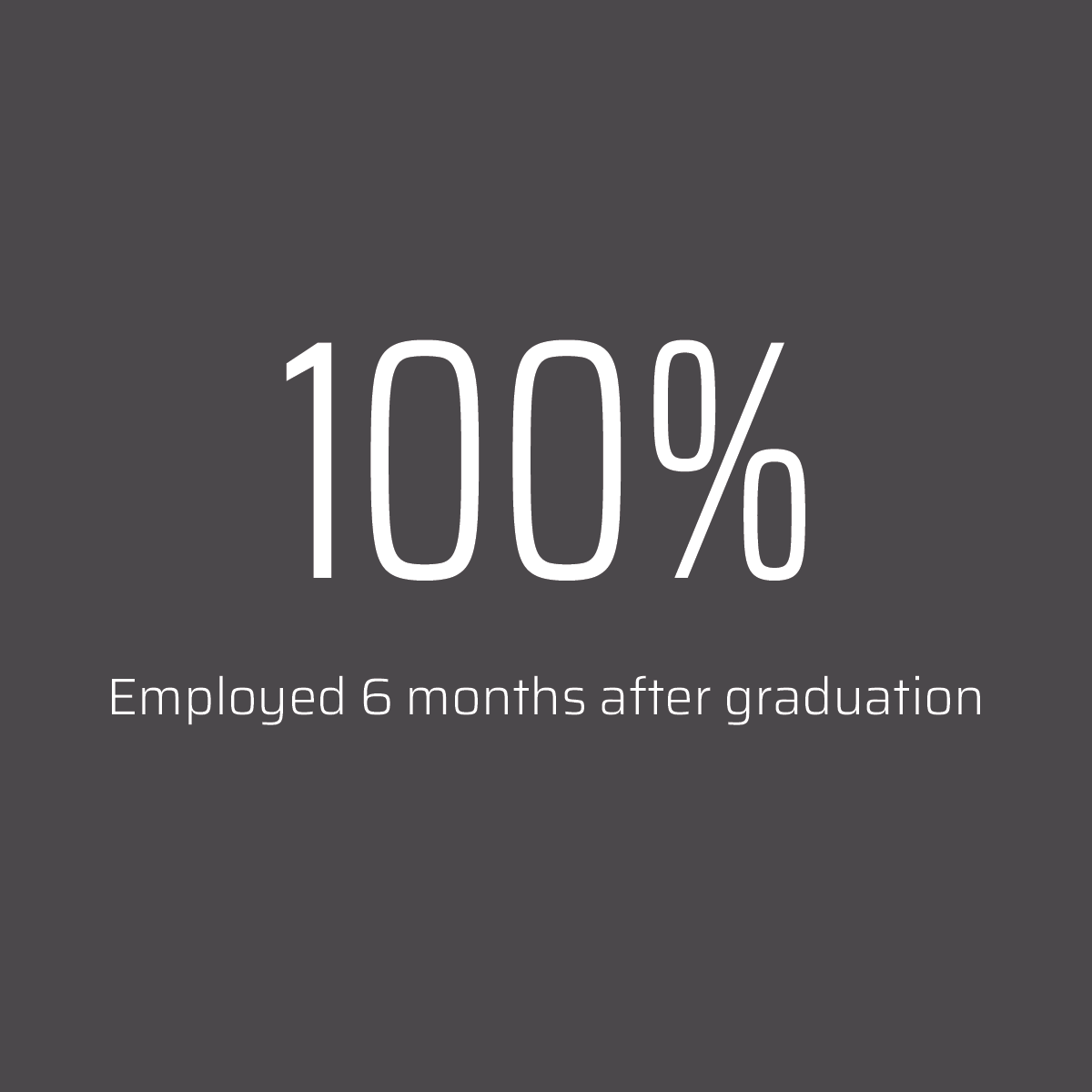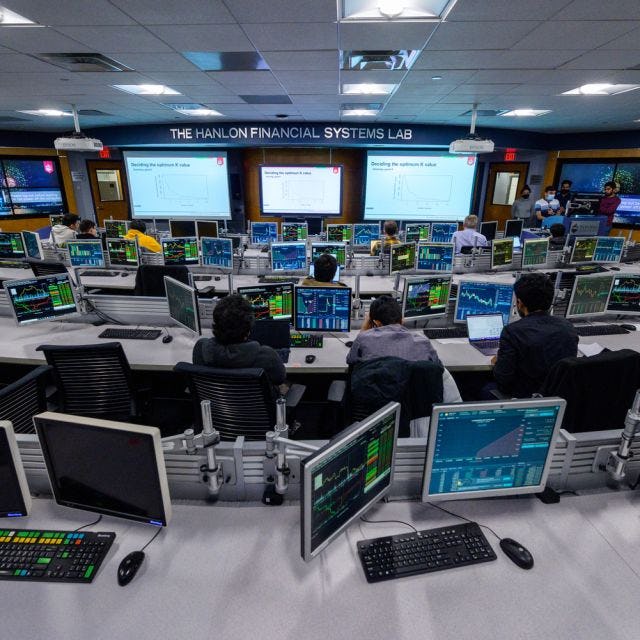
Financial Technology and Analytics Master's Degree
Program Details
Degree
Master of ScienceAvailable
On Campus & OnlineToday's financial industry is driven by technology, making it essential for professionals to have expertise in areas such as financial technology, data science, and advanced analytical modeling.
Program Highlights
Job Ready from the Start: Our master’s degree in financial analytics is designed with an ever-evolving, leading-edge curriculum that equips students with the skills and knowledge sought after by top employers in the finance industry. The program's real-world relevance ensures graduates are job-ready from day one. Stevens alumni have built a solid foundation of excellence that future graduates are prepared to build on.
Wall Street Tools: Students gain hands-on experience with the latest technologies used by Wall Street firms and global financial institutions, providing them with a competitive edge in the job market. The program's emphasis on practical application ensures seamless integration into dynamic finance roles.
Personalized Path, Tailored Success: The program culminates in a capstone consulting or research experience, allowing you to apply your knowledge to real-world scenarios. With the guidance of a dedicated faculty advisor, you'll customize your degree through a strategic selection of electives. This personalized approach ensures your educational journey is tailored to your goals, setting you on the path to success.
Powerful Professional Networks: Faculty members maintain close ties with the finance industry, enabling them to connect students with valuable professional networks and discover opportunities that align with their individual interests and career aspirations. This personalized approach helps ensure a smooth transition from academia to the workforce.
The Heart of Global Finance: Located so close to the financial capital of the world, New York City, Stevens provides students with unparalleled access to industry leaders, networking events and real-world finance experiences. Our strategic location offers a competitive advantage for students seeking to launch successful careers in the heart of global finance.
Meta-Learning for a Competitive Edge: Develop invaluable meta-learning skills through our innovative curriculum, including the FA800 course, which fosters research abilities, communication prowess and interest in result-oriented techniques. By mastering the art of breaking down complex issues swiftly to create data-driven solutions, gaining insights into thinking processes, attitudes, motivation, and decision-making contexts, you'll cultivate a meta-learning mindset that has become increasingly crucial in the digital era.
Forging the Future of Fintech: A collaboration between Stevens and Rensselaer Institute of Technology (RPI), The Center for Research toward Advancing Financial Technologies (CRAFT) was the first fintech-focused Industry University Cooperative Research Center (IUCRC) funded by the National Science Foundation. The Center offers students an amazing opportunity to delve into research in the rapidly evolving world of financial technology and to network with other academics and industry professionals.
GMAT/GRE test scores are optional for all master’s programs except MBA. Applicants who think that their test scores reflect their potential for success in graduate school may submit scores for consideration.
Data Science for Wall Street
At Stevens, financial analysts combine their programming skills with talents in data analysis and statistics to design innovative solutions to finance problems. Financial Analysts also use excellent business and communication skills to assess client needs and make recommendations to executive teams.
The Master's in Financial Technology and Analytics program is designed for STEM students who are looking to pursue careers in the financial industry. The program covers a range of topics in financial technology and data science, including financial technology, blockchain technologies and decentralized finance, digital payment technologies and trends, applied statistics with applications in finance, introduction to financial risk management, and time series with applications to finance or advanced financial econometrics.
Graduates of our program will be well-equipped to lead financial technology and data science teams in both start-ups and established financial firms. They will be able to build advanced analytical models, make enterprise data analytics decisions, and orchestrate advanced financial systems technology resources in a cloud-based data-driven distributed environment. They will also have the skills to construct innovative financial products and apply their expertise to a range of general financial services analytics.
Our faculty are experts in the field and are constantly exploring new concepts in machine learning, data modeling, and optimization in finance. Students will have the opportunity to learn from these professionals and work with the data analysis and visualization tools used on Wall Street in our state-of-the-art financial labs.
M.S. in Financial Technology and Analytics Careers
Data Analyst
Data Engineer
Financial Specialist
Quantitative Researcher
Quantitative Risk Analyst
Risk Management Analyst
Trading Analyst
Potential hiring organizations include companies like: Alphabet, American Express, Barclays, BlackRock, JP Morgan Chase Co, KPMG, PNC Bank, UBS and more.
Admissions Criteria
Admission to the Financial Technology and Analytics master’s program is competitive. GMAT and GRE scores are optional, but candidates applying to this program with strong scores are encouraged to submit them with their application. To be considered for this program, your application must include the following.
Experience Recommended
You may apply to the Financial Technologies and Analytics program without any work experience, but students without work experience will need excellent academic credentials from their undergraduate work, with a degree in statistics, mathematics, physics, engineering, or another math or science discipline.
For finance professionals interested in working in an analyst capacity, work experience is preferred. To keep up with the technical nature of coursework, computer science and statistics skills also are required.
A list of general Stevens admissions criteria is available at Graduate Academics & Student Success.
Ideal candidates for the program will have a strong background in statistics, mathematics, physics, engineering or a related discipline, or will have several years' experience working in finance with an interest in exploring these disciplines in great depth.
Preferred Application Deadlines
APPLICANT | FALL | SPRING | SUMMER (Domestic Applicants Only) |
|---|---|---|---|
Master's Full-Time | April 15 | November 1 | May 1 |
Master's Part-Time | August 15 | January 1 | May 1 |
Graduate programs admit students on a "rolling" basis, meaning that students may still apply after the preferred deadlines.
Students requiring an F1 Visa are strongly encouraged to apply by the preferred deadlines to allow time for visa processing.
The Technology and Financial Analytics program has two concentrations:
• The Financial Data Science concentration focuses on Data Analysis and Machine Learning applications to Finance.
• The Financial Technology concentration is focused on the newest technology emerging in recent years.
As a student, you are required to choose one of the concentrations, and additionally customize your degree with a set of four elective courses, including the chance to pursue a structured specialization tailored to your career interests. A close collaboration between you and your faculty advisor will help you select the right classes for your future.
The Technology and Financial Analytics master's program at Stevens is available on campus or fully online.
Core Courses
These 9 credits are required for both concentrations. The students will learn fundamental data techniques, SQL, as well as machine learning techniques. FA582 and FE513 are first semester classes, while the capstone FA800 is to be completed in the last semester.
Concentrations
The students in the M.S. in Financial Technology and Analytics are required to choose one of the following two concentrations. Please expand to see the courses in each concentration.
Capstone Course or Master's Thesis
Students are required to complete a significant project as part of their Master experience. They can choose to complete the FA 800 Project in Financial Analytics during their final semester. They would work in teams often on projects offered by our industry partners.
Alternatively, the students may complete a thesis option. This means completing FA900 over two consecutive semesters. The project is going to be individual and will prepare the students in case they wish to pursue a Ph.D. degree in Data Science.
Meet the Program Director
Ionut is a research professor in financial engineering and the Director of the Hanlon Financial Systems Lab at Stevens. His research interest is concentrated primarily in the area of stochastic processes and applications to finance; however his work is about applying sound mathematical modeling techniques to any area of science and engineering. He has authored or co-authored four books and published 47 book chapters and journal articles. Ionut has worked at Stevens since 2005 since obtaining his Ph.D. in statistics from Purdue University. His education includes a bachelor’s degree in mathematics and a master’s in stochastic processes (1997) from the University of Bucharest, Romania as well as a master’s in computational finance from Purdue University.








